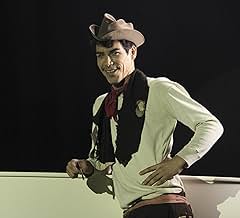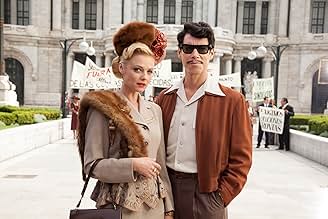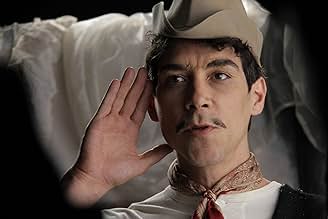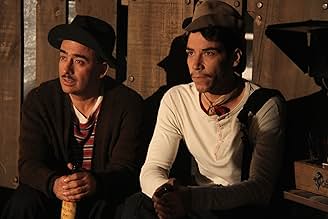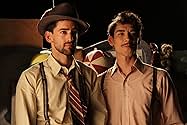AVALIAÇÃO DA IMDb
6,6/10
4,3 mil
SUA AVALIAÇÃO
A história não contada do maior e mais amado astro de comédia do México de todos os tempos, desde suas origens humildes no pequeno palco até as luzes brilhantes de Hollywood.A história não contada do maior e mais amado astro de comédia do México de todos os tempos, desde suas origens humildes no pequeno palco até as luzes brilhantes de Hollywood.A história não contada do maior e mais amado astro de comédia do México de todos os tempos, desde suas origens humildes no pequeno palco até as luzes brilhantes de Hollywood.
- Direção
- Roteiristas
- Artistas
- Prêmios
- 30 vitórias e 11 indicações no total
Arantza Muñoz
- Bailarina
- (as Aranzta Muñoz)
Armando Vega Gil
- Músico Salón
- (as Armando Vega-Gil)
- Direção
- Roteiristas
- Elenco e equipe completos
- Produção, bilheteria e muito mais no IMDbPro
Avaliações em destaque
Encapsulating and portraying the life and talent of Mario Moreno "Cantiflas" on the big screen is indeed a challenge that probably most producers would like to avoid. Nonetheless, knowing full well the challenges ahead of them, the director and producers of the film managed to put together a compelling story that resonates with moviegoers of today. Cantiflas is simply the story of a poor and humble Mexican in the early 1930's when mostly talent, inheritance and luck were the only ways out of poverty. The story is told in such a way that those unfamiliar with Cantiflas can quickly recognize and appreciate the breadth and depth of the golden age of Mexican cinema and one of its most shinning stars, Mario Moreno.
It is obvious that the lead actor, Óscar Jaenada spent a considerable amount of time watching Cantinflas movies to be able to imitate his voice and mannerism. He does a decent job portraying one of most intricate comedians of all time, which in itself is a very arduous task.
Undoubtedly, the film pays tribute to the Golden Age of Mexican Cinema of the 1940's and 1950's, with all its splendor and flair. Hopefully, it would serve as an inspiration for a new generation of filmmakers to appreciate the rich legacy given to them.
It is obvious that the lead actor, Óscar Jaenada spent a considerable amount of time watching Cantinflas movies to be able to imitate his voice and mannerism. He does a decent job portraying one of most intricate comedians of all time, which in itself is a very arduous task.
Undoubtedly, the film pays tribute to the Golden Age of Mexican Cinema of the 1940's and 1950's, with all its splendor and flair. Hopefully, it would serve as an inspiration for a new generation of filmmakers to appreciate the rich legacy given to them.
I attended this movie without knowing anything about Cantinflas. I am pleased to report that this movie is informing and entertaining. The time zone depicted is about 1935-1956 in Mexico.
The production quality is first rate. However, understand that the lighting and camera angles approximate what was being used in the 1940s and 50s. Therefore, this film has a simple look, an historical feel about it. I particularly enjoyed the costumes and fashions of the actresses during the 40s and 50s.
I strongly suggest that you read "Wiki" descriptions of his career before you see the movie. This will cause you to understand the importance of this man to Mexico and to the U.S. In fact, when he died, Mexico had 3 days of mourning; and the U.S. Senate had a moment of silence to honor this actor.
Cantinflas was a Mexican comedian at approximately the level of a Charlie Chaplin or Bob Hope. He started from humble street origins in Mexico and slowly worked his way to Hollywood. He eventually starred in "80 Days Around the World" which featured top stars and won several Oscars.
His name is an invention that may roughly translate in Spanish to, "He who drinks too much in the Cantina".
This film has both English and Spanish subtitles which alternate at appropriate times.
Cantiflas's act might be called "family entertainment" worthy of reaching wide audiences. There is no outrageous violence, no sex, no drug usage, no monsters, no superheros, no flaming car crashes. The story is a predictable rags to riches story which makes for quality and gentle Sunday afternoon entertainment. Religious people should not be offended. This story reinforces the belief that hard focused work may be rewarded with fame and happiness.
This film is more about the events and people which brought Mario Moreno (Cantinflas) to success on stage and film. His performances are not detailed, not lengthy, only suggestions of his talent. If his performances were recreated, I think this movie would gain a higher rating. You will see Marlon Brando, Elizabeth Taylor, Yule Brenner, Charlie Chaplin and others played out in this film as well.
When you read the "Wiki" description, you will understand that he created a kind of humor which allowed him to use a free form style, he was an ad lib artist. Perhaps he could be compared to the late Robin Williams. From what I heard during the show he had a light touch to his truth telling on stage.
Cantinflas is always a respectable story; and you should not be embarrassed to bring any friend to see this film with you. I am not of Mexican heritage. About 95% of those in the audience seemed to be Mexican. So, you now know that you could be broadening your education of film history to see this film. And again, I think that if you grew up seeing his films, you will enjoy this movie more and give it a higher rating here on IMDb. If not, then for you we have a predictable, simple story which may earn a 6.5 or 7.0 on IMDb.
I particularly enjoyed seeing Mexico, the buildings, the fashions, the restaurants at their very polished best. The music is romantic. I felt that if I had seen his film when I was young, this film would have provided me with the "nostalgia effect". Nonetheless, it was a nice visit to Mexico during the 1940s.
The direction of the film was conservative and never confused. There were no "tricks" of the director to distract me from the simple, linear story.
And there is the greatest value of this film: nostalgia. Older folks who witnessed his acts will gain the most benefit from this reenactment of his past. Those older people will no doubt relive their youth as they enjoy seeing Mario Moreno go through his trials to finally appear in theater and film to become a national hero.
There are very few dark moments. And no foul language that I could detect.
Cantinflas was a master comedian. However, I do not think this movie could truly reproduce the comedic timing that Cantinflas used. Therefore, Cantinflas's wit is not displayed in this movie in a manner that I could laugh at most of the time. Subtitles slow down the delivery of his jokes. The effect of surprise in his jokes is muted by the English translation and the use of subtitles. So, as a film goer I am at a disadvantage. His jokes were gentle surprise one liners that entertained families on stage in the Cantinas of Mexico and film. But I am hardly an expert on his career. All I have seen is this movie.
I think that if you wanted to treat a person to a gentle story, with only a few moments of aggressive drama, you would be safe to bring any friend to see this film. This is a "nice film." And if that friend were born around 1940, all the better. And now I want to know more about Mario Moreno's career. And I would like to experience the results of his comedic timing from the master. Charlie Chaplin is said to have considered him the most humorous man in theater. That is quite a compliment.
Mario Moreno upset the Union of Actors in Mexico. He shunned the studio system of Hollywood, too. Yet he rose from the very bottom of Mexican society to become an Oscar winning actor.
This film is safe, gentle entertainment. I feel I broadened my understanding of film history after seeing this movie. I recommend you see it too. I am sure you will leave the theater with a warm, gentle feeling.
The production quality is first rate. However, understand that the lighting and camera angles approximate what was being used in the 1940s and 50s. Therefore, this film has a simple look, an historical feel about it. I particularly enjoyed the costumes and fashions of the actresses during the 40s and 50s.
I strongly suggest that you read "Wiki" descriptions of his career before you see the movie. This will cause you to understand the importance of this man to Mexico and to the U.S. In fact, when he died, Mexico had 3 days of mourning; and the U.S. Senate had a moment of silence to honor this actor.
Cantinflas was a Mexican comedian at approximately the level of a Charlie Chaplin or Bob Hope. He started from humble street origins in Mexico and slowly worked his way to Hollywood. He eventually starred in "80 Days Around the World" which featured top stars and won several Oscars.
His name is an invention that may roughly translate in Spanish to, "He who drinks too much in the Cantina".
This film has both English and Spanish subtitles which alternate at appropriate times.
Cantiflas's act might be called "family entertainment" worthy of reaching wide audiences. There is no outrageous violence, no sex, no drug usage, no monsters, no superheros, no flaming car crashes. The story is a predictable rags to riches story which makes for quality and gentle Sunday afternoon entertainment. Religious people should not be offended. This story reinforces the belief that hard focused work may be rewarded with fame and happiness.
This film is more about the events and people which brought Mario Moreno (Cantinflas) to success on stage and film. His performances are not detailed, not lengthy, only suggestions of his talent. If his performances were recreated, I think this movie would gain a higher rating. You will see Marlon Brando, Elizabeth Taylor, Yule Brenner, Charlie Chaplin and others played out in this film as well.
When you read the "Wiki" description, you will understand that he created a kind of humor which allowed him to use a free form style, he was an ad lib artist. Perhaps he could be compared to the late Robin Williams. From what I heard during the show he had a light touch to his truth telling on stage.
Cantinflas is always a respectable story; and you should not be embarrassed to bring any friend to see this film with you. I am not of Mexican heritage. About 95% of those in the audience seemed to be Mexican. So, you now know that you could be broadening your education of film history to see this film. And again, I think that if you grew up seeing his films, you will enjoy this movie more and give it a higher rating here on IMDb. If not, then for you we have a predictable, simple story which may earn a 6.5 or 7.0 on IMDb.
I particularly enjoyed seeing Mexico, the buildings, the fashions, the restaurants at their very polished best. The music is romantic. I felt that if I had seen his film when I was young, this film would have provided me with the "nostalgia effect". Nonetheless, it was a nice visit to Mexico during the 1940s.
The direction of the film was conservative and never confused. There were no "tricks" of the director to distract me from the simple, linear story.
And there is the greatest value of this film: nostalgia. Older folks who witnessed his acts will gain the most benefit from this reenactment of his past. Those older people will no doubt relive their youth as they enjoy seeing Mario Moreno go through his trials to finally appear in theater and film to become a national hero.
There are very few dark moments. And no foul language that I could detect.
Cantinflas was a master comedian. However, I do not think this movie could truly reproduce the comedic timing that Cantinflas used. Therefore, Cantinflas's wit is not displayed in this movie in a manner that I could laugh at most of the time. Subtitles slow down the delivery of his jokes. The effect of surprise in his jokes is muted by the English translation and the use of subtitles. So, as a film goer I am at a disadvantage. His jokes were gentle surprise one liners that entertained families on stage in the Cantinas of Mexico and film. But I am hardly an expert on his career. All I have seen is this movie.
I think that if you wanted to treat a person to a gentle story, with only a few moments of aggressive drama, you would be safe to bring any friend to see this film. This is a "nice film." And if that friend were born around 1940, all the better. And now I want to know more about Mario Moreno's career. And I would like to experience the results of his comedic timing from the master. Charlie Chaplin is said to have considered him the most humorous man in theater. That is quite a compliment.
Mario Moreno upset the Union of Actors in Mexico. He shunned the studio system of Hollywood, too. Yet he rose from the very bottom of Mexican society to become an Oscar winning actor.
This film is safe, gentle entertainment. I feel I broadened my understanding of film history after seeing this movie. I recommend you see it too. I am sure you will leave the theater with a warm, gentle feeling.
I've seen the movie "Cantinflas" directed by Sebastian del Amo, and I am convinced that this is "the film that every Mexican must-see". This is biopic is the story of Mexico's greatest and most beloved comedy film star of all time, Mario Moreno "Cantinflas". The film follows him from his humble beginnings on the small stage to the bright lights of Hollywood.
On one side you discover the man: Mario Moreno who expressed his values through his Cantinflas character on films and stage. Cantinflas gives voice to social issues: on his films he would protest against injustice, keeping his cool being sincere, generous, honest and optimistic. Cantinflas never resorted to vulgarity, nor to profanity, insults or violence to make us laugh, and his unique speech style (cantinflear) reflects the demagogic rhetoric we hear from politicians. We all recognize on Mario Moreno "Cantinflas" a Mexican hero who overcame poverty and lack of formal education to become an artist and humanist, recognized worldwide.
On the other hand, there is the film where actor Oscar Jaenada does a masterful "incarnation" of Mario Moreno Cantinflas. Thanks to Oscar's credibility and this film's quality production, more people attended movie theaters to watch the movie and a new generations will better understand Cantinflas legacy and values.
In addition, the performances of other actors like Ilse Salas, Barbara Mori, Gabriela de la Garza and Luis Gerardo Méndez, to name a few, were preceded by months of preparation and are really a tribute to the characters they play. Original music by Aleks Syntek. Screen play by Edui Tijerina, and excellent production of entrepreneurs Vidal Garza Cantú, Adolfo Franco, Alejandro Barron, and Mario Moreno Ivanova. Thus, "Cantinflas" brings to life Mexico's hero, so this is a most- see film for everyone in Mexico, and elsewhere.
On one side you discover the man: Mario Moreno who expressed his values through his Cantinflas character on films and stage. Cantinflas gives voice to social issues: on his films he would protest against injustice, keeping his cool being sincere, generous, honest and optimistic. Cantinflas never resorted to vulgarity, nor to profanity, insults or violence to make us laugh, and his unique speech style (cantinflear) reflects the demagogic rhetoric we hear from politicians. We all recognize on Mario Moreno "Cantinflas" a Mexican hero who overcame poverty and lack of formal education to become an artist and humanist, recognized worldwide.
On the other hand, there is the film where actor Oscar Jaenada does a masterful "incarnation" of Mario Moreno Cantinflas. Thanks to Oscar's credibility and this film's quality production, more people attended movie theaters to watch the movie and a new generations will better understand Cantinflas legacy and values.
In addition, the performances of other actors like Ilse Salas, Barbara Mori, Gabriela de la Garza and Luis Gerardo Méndez, to name a few, were preceded by months of preparation and are really a tribute to the characters they play. Original music by Aleks Syntek. Screen play by Edui Tijerina, and excellent production of entrepreneurs Vidal Garza Cantú, Adolfo Franco, Alejandro Barron, and Mario Moreno Ivanova. Thus, "Cantinflas" brings to life Mexico's hero, so this is a most- see film for everyone in Mexico, and elsewhere.
As much as I love learning about the history of Hollywood, there can be something pretentious about the Hollywood biopic. The story of a great creative mind taking Hollywood by storm is one that's been told too many times and easily falls into repetition. Aside from that, there's always the sneaking suspicion that the screenwriter or director is co-opting his subject's story to wrestle with his own greatness.
"Catinflas" intrigued me enough at the start that I decided to throw caution to the wind hoping the plot wouldn't veer into cliché. I enjoyed seeing the trial and error process over how Catinflas discovered his true calling, I thought the setting was unique (especially the unforgiving Mexican stage where heckling is the norm) and the actor who played Catinflas had a magnetic working-man kind of presence.
The decision to intercut the story of Mario "Catinflas" Morelli's ascension to fame over the years and the trials and tribulation "Around the World in 80 Days" producer Michael Todd to get his film made, also had potential except for the fact Michael Todd seemed like a rather flat character (not to take anything away from Imperioli's performance), and while I enjoyed "Around the World in 80 Days" as a kid, I'm not sure if there's anything to celebrate in Todd's methodology of putting every actor he could find in the film.
The storyline itself is one I've seen a hundred times before, so the film was largely on the shoulders of Oscar Jaenada and to the degree he could, Jaenada did an extraordinary job. If only he had slightly better material to work with.
"Catinflas" intrigued me enough at the start that I decided to throw caution to the wind hoping the plot wouldn't veer into cliché. I enjoyed seeing the trial and error process over how Catinflas discovered his true calling, I thought the setting was unique (especially the unforgiving Mexican stage where heckling is the norm) and the actor who played Catinflas had a magnetic working-man kind of presence.
The decision to intercut the story of Mario "Catinflas" Morelli's ascension to fame over the years and the trials and tribulation "Around the World in 80 Days" producer Michael Todd to get his film made, also had potential except for the fact Michael Todd seemed like a rather flat character (not to take anything away from Imperioli's performance), and while I enjoyed "Around the World in 80 Days" as a kid, I'm not sure if there's anything to celebrate in Todd's methodology of putting every actor he could find in the film.
The storyline itself is one I've seen a hundred times before, so the film was largely on the shoulders of Oscar Jaenada and to the degree he could, Jaenada did an extraordinary job. If only he had slightly better material to work with.
Cantinflas (2014) should have been a clever little gem about a piece of forgotten film history but ends up being a solidly boring mish-mesh of a film that did little justice to its subject matter. In it Cantinflas aka Mario Moreno (Oscar Jaenada) works his way up from a minor vaudeville player on the streets of Mexico City to one of the most beloved Mexican actor/comedians of all time.
He does so while a second, mostly English tale unfolds. Michael Todd (Michael Imperioli) a wily producer at United Artists is trying to cobble together the 1956 theatrical version of Around the World in 80 Days. He boasts to the studio exec that he can convince over forty international film stars to be in the film but in reality he barely has Elizabeth Taylor on the hook. In an attempt to make the film salvageable he asks the ever-popular Cantinflas to make a cameo appearance.
Despite polished period detail and some worthwhile performances, Cantinflas feels cheap and more than a bit off. The cinematography colludes into a mix of flat browns and grays and everyone seems to be spotted by florescent lights. One cannot help but wonder if this story was given to a more mature director we'd be able to see and enjoy the vibrant colors of Mexico and the luster of old Hollywood.
The film is also betrayed by a script that fails to staple the important moments or rather the two largest threads into a story of urgency. The turbulent labor politics of Moreno's time get the same compromised treatment as his early roving theatre career. His height of popularity is as deflated as the 80 Days subplot. It's as if the editors lost a few key scenes on the cutting room floor and pasted half-shot scenes together hoping the audience wouldn't notice.
There's one nearly-poignant scene where Cantinflas, in a "success is ruination"-type stupor sees a note of encouragement by none other than Charlie Chaplin. Again I say near-poignant because up until that moment we never knew Chaplin's opinion was important to Cantinflas. Goaded by the letter, once Cantinflas agrees to do Around the World in 80 Days it leaves him without catharsis or character change. His wife seemed to think fame was going to his head so appearing in the film he's most internationally recognized for wouldn't have solved that dispute; yet it did.
Cantinflas attempts to create a stereotypical biographical film out of a figure that, given the events of the film, deserved better. At best this film deserves to be on cable and given a Hallmark type release, not a theatrical one. Maybe in the decades to come people will honor his contribution to his nation's cinema with a movie that immortalizes the man properly. Now that would be the rub.
http://www.theyservepopcorninhell.blogspot.com
He does so while a second, mostly English tale unfolds. Michael Todd (Michael Imperioli) a wily producer at United Artists is trying to cobble together the 1956 theatrical version of Around the World in 80 Days. He boasts to the studio exec that he can convince over forty international film stars to be in the film but in reality he barely has Elizabeth Taylor on the hook. In an attempt to make the film salvageable he asks the ever-popular Cantinflas to make a cameo appearance.
Despite polished period detail and some worthwhile performances, Cantinflas feels cheap and more than a bit off. The cinematography colludes into a mix of flat browns and grays and everyone seems to be spotted by florescent lights. One cannot help but wonder if this story was given to a more mature director we'd be able to see and enjoy the vibrant colors of Mexico and the luster of old Hollywood.
The film is also betrayed by a script that fails to staple the important moments or rather the two largest threads into a story of urgency. The turbulent labor politics of Moreno's time get the same compromised treatment as his early roving theatre career. His height of popularity is as deflated as the 80 Days subplot. It's as if the editors lost a few key scenes on the cutting room floor and pasted half-shot scenes together hoping the audience wouldn't notice.
There's one nearly-poignant scene where Cantinflas, in a "success is ruination"-type stupor sees a note of encouragement by none other than Charlie Chaplin. Again I say near-poignant because up until that moment we never knew Chaplin's opinion was important to Cantinflas. Goaded by the letter, once Cantinflas agrees to do Around the World in 80 Days it leaves him without catharsis or character change. His wife seemed to think fame was going to his head so appearing in the film he's most internationally recognized for wouldn't have solved that dispute; yet it did.
Cantinflas attempts to create a stereotypical biographical film out of a figure that, given the events of the film, deserved better. At best this film deserves to be on cable and given a Hallmark type release, not a theatrical one. Maybe in the decades to come people will honor his contribution to his nation's cinema with a movie that immortalizes the man properly. Now that would be the rub.
http://www.theyservepopcorninhell.blogspot.com
Você sabia?
- CuriosidadesOfficial submission of Mexico to the best foreign language film category of the 87th Academy Awards 2015.
- Erros de gravaçãoThe scene of shooting "Ahí está el detalle" (1940) begins with a title card indicating that filming takes place at Churubusco Studios. Churubusco facilities weren't opened until 1945. In fact, filming took place at CLASA Studios.
- Cenas durante ou pós-créditosWhile the credits role one of the most famous scenes of the film El bolero de Raquel is recreated by the actors in the film.
- ConexõesFeatures Viagem à Lua (1902)
- Trilhas sonorasScore 01/ Original Soundtrack - Cantinflas: Música Original De La Película
Composed by Roque Baños (as Roque Baños López)
Universal / Universal Music Latino / Vene
Principais escolhas
Faça login para avaliar e ver a lista de recomendações personalizadas
- How long is Cantinflas?Fornecido pela Alexa
Detalhes
- Data de lançamento
- País de origem
- Idiomas
- Também conhecido como
- Cantinflas
- Locações de filme
- Teatro de la Ciudad, Cidade do México, México(Where Cantinflas and his friends go to a show early in the film.)
- Empresa de produção
- Consulte mais créditos da empresa na IMDbPro
Bilheteria
- Orçamento
- US$ 3.000.000 (estimativa)
- Faturamento bruto nos EUA e Canadá
- US$ 6.382.924
- Fim de semana de estreia nos EUA e Canadá
- US$ 2.661.253
- 31 de ago. de 2014
- Faturamento bruto mundial
- US$ 17.998.703
- Tempo de duração
- 1 h 42 min(102 min)
- Cor
Contribua para esta página
Sugerir uma alteração ou adicionar conteúdo ausente

![Assistir a Tráiler [OV]](https://m.media-amazon.com/images/M/MV5BMDJhMDMxOTYtODA3MS00YTQzLWEyODctM2M1Y2FiZjI5YjBkXkEyXkFqcGdeQXRodW1ibmFpbC1pbml0aWFsaXplcg@@._V1_QL75_UX500_CR0)





